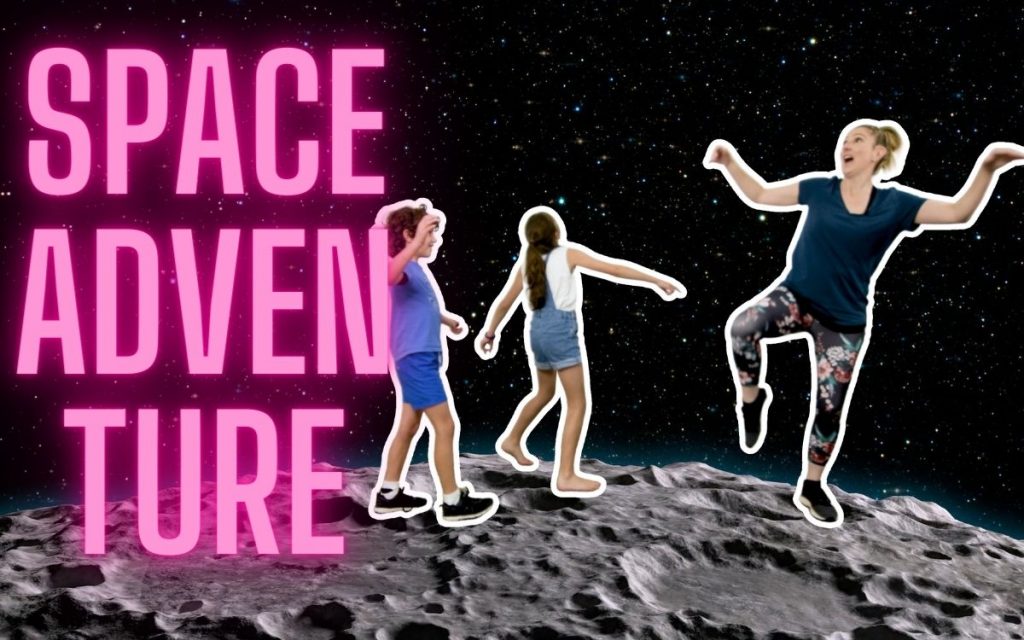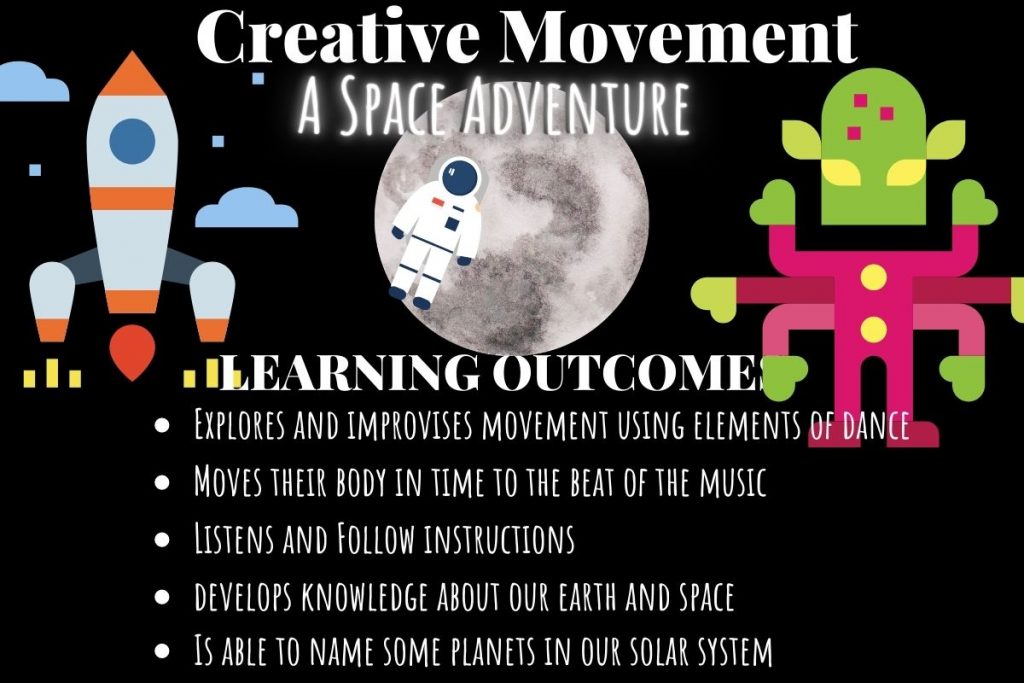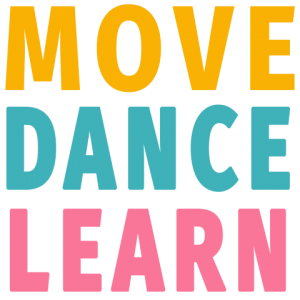
Join us as we travel through space past all the planets and then land on the moon for a beyond gravity dance experience. This creative movement dance lesson starts off with a warm-up, ends with a cooldown – but in between, we use creative dance and movement to go on an intergalactic adventure even meeting some life forms from another planet.
We creatively explore moving in ways that represent a rocket, walking on the moon, and how we think an alien life form might move their bodies when walking, dancing, running, and more. I have carefully selected music to help ignite the imagination and provide a beat and rhythm to dance to.
This class is great for anyone with an interest in not only space, but also dancing in general and is great for both young toddlers as well as older kids. As you can see in the video my children 8 and 10, loved being creative with their movement, and my 2-year-old when he had a chance to watch has never been so engaged following along at home – he especially loves the rocket!
Click here to go straight to a playlist on Youtube of dance classes by Move Dance Learn. Don’t forget to subscribe to get notifications as the library is growing every week!
Questions Parents and Kids Ask About Teaching and Learning About Space!!!
Because most of us, ok nearly all of us have never been to space, it can be a tricky thing to teach and learn about. The following are researched answers to a few of the top burning questions both parents, educators, students and children have about Space as a starting place for learning.
How do you start learning about space?
The best way to introduce space to a child is through the closest experience you can give them and that is to lie under the stars at night and talk about all the things you can see up in the sky. Do this often enough and your child will start to ask you questions about what they see. Don’t worry if you can’t answer everything like which bright star is actually a planet or how far everything is from Earth because you will probably find that these unanswered questions spark curiosity in both of you, which in turn will mean you will get books about space to learn more or watch Youtube videos and visit websites together!
How do you explain Space to a Child?
Space also known as outer space can be simply described as everything that lies outside of Earths atmosphere or the edge of the circle or sphere that is our Earths boundary. Some of the things that are in space are stars like our sun, other planets, asteroids and comets, satellites and other objects placed in Earths orbit by humans, galaxies and many other things humans are yet to explore and discover.
What Does Space Smell Like?
Space to the astronauts who have been there smells bitter or acrid and smoky or burnt. They describe space as having a very distinct smell, but not one they have ever fully experienced on Earth. Some liken it to Gunpowder or a metallic smell especially one that comes when someone is welding or melting metals together. The thing is Astronauts can’t actually smell space when in space – it would kill them to take off their suits or helmets in space. Instead, they experienced the smell after moon walks, or after being on space walks when particles stuck to their suits or the smell wafted in and stayed after closing the airlocks.
Can A Child Go To Space?
Theoretically, yes a child could go to space. But because space travel today is mainly conducted for research and is astronomically expensive only the most well-trained astronauts are given the job. Space travel is also extremely hard on the human body and therefore sending a child to space might to some be seen as being irresponsible as it could affect their immune system, development of the skeletal system and more. Also space travel isn’t really as exciting as you might think…. if you have ever travelled on a plane or even car or train for long distances and not been able to move out of your seat for hours and hours, this would be what most of your adventure in space would entail!
Has Anyone Been Lost In Space?
No, no one has ever been lost in space like in the television show of the same name. At times there has been a loss of communication with shuttles and astronauts for various reasons such as re-entry to the Earths atmosphere or our lack of communcation technology especially early on during the space race, but no one has been lost in space.
Can I Jump Off The Moon?
No, although a human can jump extremely high on the moon because it has less gravity than Earth, it still has gravity pulling you to the surface and so you can not jump off into space. You would need to move at a speed of more than 2km per second to be able to do that and even the fastest recorded jump by Javier Sotomayor only reached a speed of 7 metres per second!
How Much Do Astronauts Get Paid?
Astronauts earn between $US66,167 to $US161,141 per year according to business insider. Salaries are based on Government pay scales and can also depend on whether the astronaut is a civilian or military service member.
How Do Astronauts Poop?
Today astronauts poop on a toilet. But it’s no ordinary toilet, they have to buckle themselves in or hold onto handles so they don’t float away. The hole is extremely small and they even have to practice aiming into the hole and do their business on them here on Earth. In the hole is a pan and seperate vacuum systems take away the poo and wee. The wee is actually recycled into drinking water for the astronauts to reuse!
LINKS TO THE CURRICULUM
As I have a Bachelor of Education and have taught in primary schools in Australia, I am always looking at ways to creatively teach children and regularly used dance and movement in my classroom to enforce learning of concepts and material we were learning about in different areas of the school curriculum.

The following are some links and connections that can be made from this movement lesson to various other areas of learning!
Mathematics and Arithmetic
- For the younger years focus on the count down – counting backward from 10 and then from other larger numbers.
- Count stars, use star cutouts to practice addition and subtraction problems.
- Compare the measurements of the planets – their diameters, weight, distance from the sun, from each other.
- Investigate how the early astronomers used mathematics to uncover how far the sun and planets were away from each other without actually measuring them physically.
English and Literacy
- Space spelling list.
- Create a list of adjectives to describe Space and the planets.
- Create and draw what you think an alien would look like, then label your creation using as many adjectives and verbs as you can to describe its features and how it moves.
- Write a narrative or fictional story about an outer space adventure or what it might be like to live on another planet.
- Create your own imaginary planet and beings that live there and write an explanation to tell people everything they need to know about living there.
- Research and then write a report or explanation about your favorite planet.
- Write an argumentative or persuasive essay on whether you believe investing in space travel is justified in our world today.
Social Studies and History
- Investigate the different beliefs about our universe, myths and legends that were created to explain for example how the sun comes up in the east and down in the west or what people believed the stars to be etc..
- Research and develop a project based on the life of an explorer, astronomers, astrophysicist or scientist who made discoveries about space. How hard was it for the early pioneers to prove their theories when they could not actually go up into space?
Science & Technology
- Create your own rocket. (This could be simple and propelled by a balloon or be more technical and use fuel).
- Make a model of the solar system.
- Investigate Earth’s rotation and yearly voyage around the sun and how this compares to other planets in our galaxy?
- Explore and investigate questions such as – What is the future of space travel? and Will we ever live on another planet?
- Investigate the sun and how it produces heat and light and use this as a springboard into exploring the topics of heat and light.
Geography
- How and why do the stars look different depending on where you are in the world?
Art

- I found this really cool art activity on Pinterest which you can click through to from the picture.
Recent Posts
Here at Move Dance Learn, we create dance videos for kids. We have so many to offer, but thought we would put together a list of our top ten dance tutorials for kids to make them easy for you to find...
Here at Move Dance Learn, we create dance videos for toddlers, preschoolers and kindergartners. We have so many to offer, but thought we would put together a list of our top ten dance videos for...
